July was INTENSE.
Over the course of the month, I playtested Distilled 21 times, 14 of which were at two major, virtual cons (each occurring over alternating weekends in July): Protospiel Online and Gen Con Online. That might sound crazy and even borderline unhealthy, and you’re probably right. But I knew two things: First, that I had to take advantage of the summer months, before heading back to my job as the Director of University of Wisconsin-Stout’s School of Art & Design. Second, Distilled underwent a fairly significant overhaul in late-June (more on that next month), and I really wanted to put my ideas and new mechanics through the ringer. As a bonus, these two cons promised to have a fairly large online player turnout, in which Protospiel was mainly comprised of designers and Gen Con had mainly gamers. In both cases, I would use Tabletop Simulator and Discord to create a smooth online experience.
So, the first big test of the month was Protospiel in mid-July.

Protospiels are glorious. Imagine a hotel’s large conference room, taken over by a bunch of geek designers over an entire weekend of playtesting each other’s games (okay, maybe glorious for some people). I attended Protospiel MN this past January, and not only made great connections, received insightful feedback, and tested lots of other games, but also forgot to eat for nearly 48 hours because I was so engrossed in the creative, iterative and collaborative experience that Protospiel naturally creates. Basically, the idea is that after your game gets played and tested, you should pay back the other playtesting designers at the table, and play their games as well. It’s a wonderful, organic experience that I definitely took for granted – like so many other in-person events – pre-COVID.
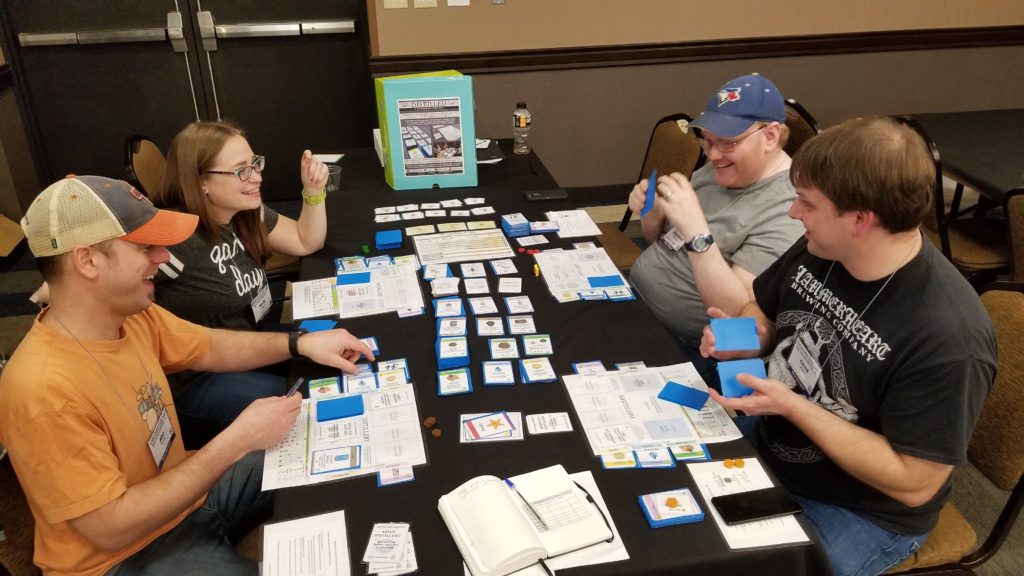
Protospiel Online attempted to create that same feeling, in a virtual space. Organized by the crew who normally runs Protospiel Denver, the event had hundreds of attendees from around the world, including both designers and playtesters. Just as with the in-person version, it was meant to be a fluid, flexible process in which people would hang out in the Discord lobby, and post a small card that implied that they were looking for players. Moderators would be there to help form tables and groups, and it was an overall pleasant and supportive experience.

I had the opportunity to play a bunch of great games by other designers, including Wild Guides: California; Duck, Duck Whatever; Scorched Throne, and many others that I can’t remember the names of! I also had a chance to playtest Distilled 5 times that weekend, and received some great feedback that pushed the game further than I would have expected in just over 48 hours. When designers play your game, they aren’t necessarily playing it because they are interested in the theme or mechanics, but because they hope that they can provide some critical (and hopefully constructive!) feedback on your design. I received some really solid advice from a myriad of folks, and ended the Protospiel with about 10 pages of notes. Because I was using Tabletop Simulator to test the game, I was able to update cards and components in-between sessions fairly quickly, taking the game from “baby steps” of progress to giant leaps over a single weekend!
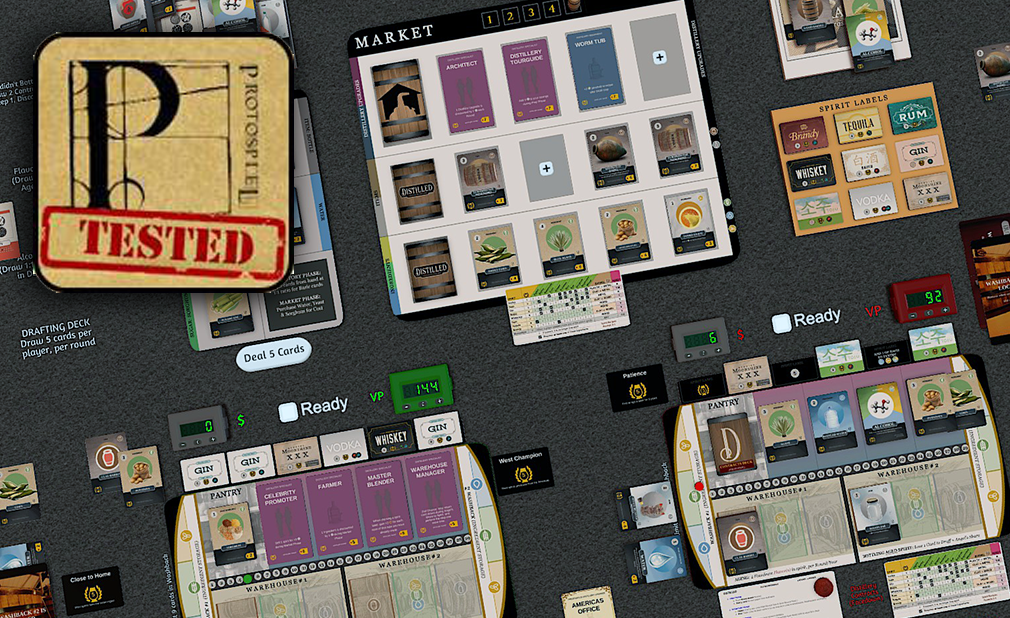
When Protospiel was over, I had a lot of work to do. The game was still coming off as too complex and overwhelming as a first play, even to designers. I’ve had this same situation in my video game design, where I start out with a very large, complex idea, and I have to whittle it down continuously until it has just its essence left. One might even say that I am distilling its design elements (sorry, couldn’t help it!). One designer even provided this challenge to me: “try getting your game down to 3 rounds, 60 minutes. That could be a core experience that appeals to a wider audience. Then you can add the other modules to make it a more complex, heavier game.”
Well, I decided to take them up on that challenge. Next stop: GEN CON Online.
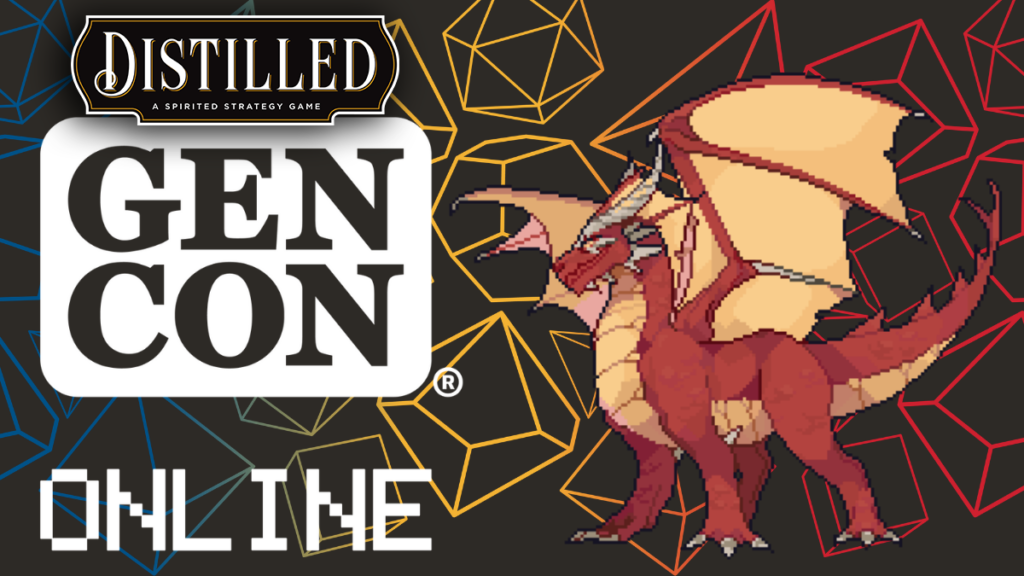
GEN CON is a beast. Normally attended by 70,000 people, this Indianapolis-based event has come to be one of the largest annual board gaming conventions in the world. While I’ve never been in person, it’s been a long-time dream of mine to attend. I was not planning (pre-COVID) to attend this year in person, due to associated costs involved with traveling and also paying to have your game playtested, so when they decided to pivot to an online offering, Gen Con blipped back on to my radar.

There were two obvious opportunities to get one’s game to the table (and thus, in front of playtesters) at Gen Con Online, and I decided to pursue them both. The first avenue is just like any other hosted game – as a ticketed event. I decided to submit Distilled for five different ticketed events and times, which was somewhat risky, because people need to purchase those tickets (for a mere $2 each, but still something worth considering). To my surprise, all five tables sold out within 30 minutes of sales opening. These games consisted of players who were excited about the idea of the game, perhaps after hearing about it somewhere else, or just being intrigued by the theme. These playtests were extremely helpful, as it represented the potential consumer for Distilled, and what they liked – and perhaps didn’t – about the current version. Thankfully, it was an overwhelmingly positive response to the game experience, which was wonderful.
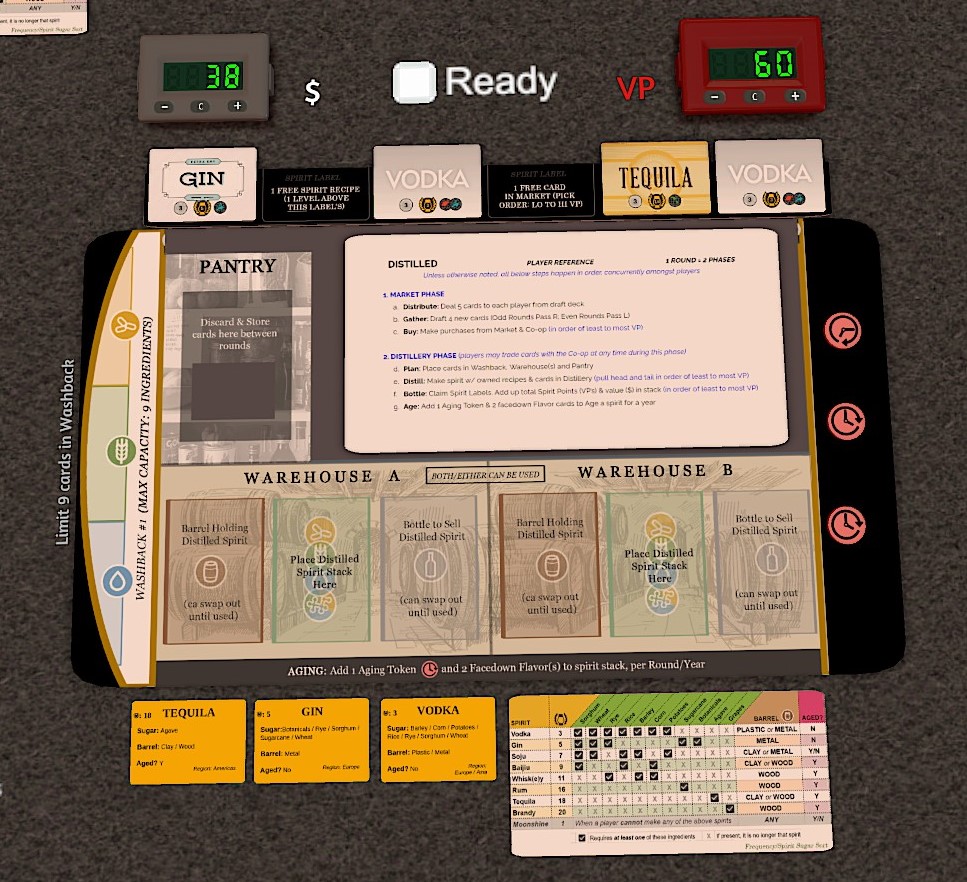
And that current version was very different than what I had playtested just two weeks earlier. It was a stripped down Distilled. Less options and less mechanics for the player to consider resulted in – what appeared to be – a smoother, more enjoyable (and quicker!) first-play. The jury is still out of course, but I’m confident that by stripping out some of the excess, it has made a more approachable game for a wider audience. The best part about this is that I haven’t thrown out the additional mechanics or options I had previously – they can now just “ship with the box” as bonus modules that will add more complexity and replay-ability to the game.
I also had the chance to playtest the game with the First Exposure Playtest Hall group (FEPO), which is a well-known entity within Gen Con. The group has an open hall of prototypes being playtested by attendees, with designers running the tests. I decided to pay the $60 to have four 2-hr slots for playtesting, in which FEPO organizers would find specific people to playtest my game. This was also an extremely helpful experience, as it once again demonstrated a wide spectrum of players and feedback. In both situations, I had players who were able to “break” my game and test new mechanics, while still having a great time.
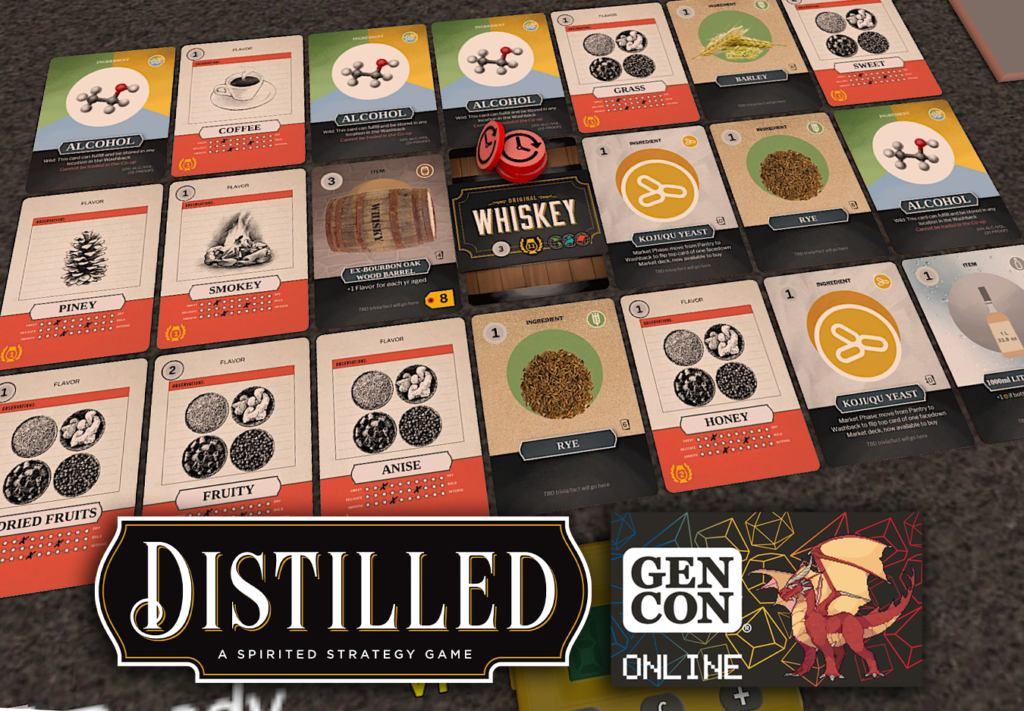
So now, as we enter August, I’m feeling very good about where the game currently stands. It still has a long way to go, but I think that the marathon playtesting month of July really paid off, especially in refining the game’s core experience while helping me to recognize that sometimes you really do need to kill your darlings to make the best game (and experience) you possibly can. Finally, I wanted to end by thanking all of the people who played and provided feedback during Protospiel and Gen Con. I’ve listed their first names below.
A special thanks to all of the playtesters who contributed their time and feedback during these momentous events (in order of appearance): Alexei, Brian, Miles, Joakim, Aaron, Andrew, Miles (again!), Caleb, Rob, Peter, Conner, Maria, Chris, Josh, Heather, Matt, Kirsten, Serge, Tim, Amber, Scott, Matt, Paul, Julissa, Miranda, Joe, Warren, Jana, Grace, Desiree, Tommy, Dean, Sonia, Charles, Christina, Sarah, Kirby, Jen, Jim, Maria, Nathan, Jane, Brian, Ian, Wil, Ellie, Jeff, Paula, and Carl).